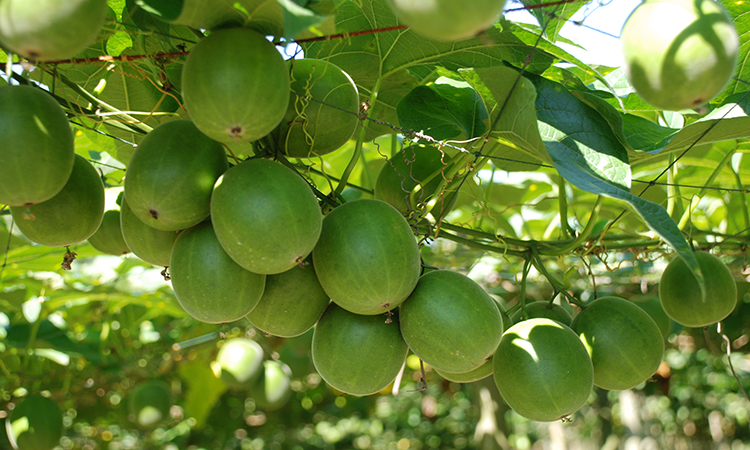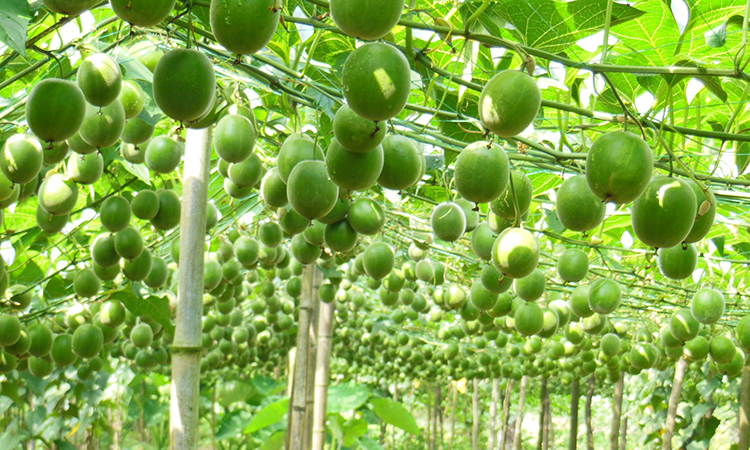“A product of its time”: Behind the scenes of monk fruit decoctions “not novel” ruling
- Like
- Digg
- Del
- Tumblr
- VKontakte
- Buffer
- Love This
- Odnoklassniki
- Meneame
- Blogger
- Amazon
- Yahoo Mail
- Gmail
- AOL
- Newsvine
- HackerNews
- Evernote
- MySpace
- Mail.ru
- Viadeo
- Line
- Comments
- Yummly
- SMS
- Viber
- Telegram
- Subscribe
- Skype
- Facebook Messenger
- Kakao
- LiveJournal
- Yammer
- Edgar
- Fintel
- Mix
- Instapaper
- Copy Link
Posted: 1 August 2024 | Grace Galler | No comments yet
With the FSA confirming that monk fruit decoctions are “not novel” foods, David Thorrold sat down with New Food to explain the process behind the ruling and his visions for the future of this natural sweetener.


Credit: Monk Fruit Corp
At the end of June 2024, the Food Standards Agency (FSA) made a significant ruling that monk fruit decoctions, a naturally sweet and low-calorie food, are “not novel.” This decision means that these decoctions can now be used as ingredients in food and beverage products sold across the UK, opening up new possibilities for manufacturers and consumers alike.
The application for this ruling was submitted by Monk Fruit Corp, a New Zealand-based company, which successfully argued that these decoctions had been consumed in the UK to a significant degree before May 1997.
The implications of this ruling are substantial, as monk fruit decoctions offer a natural alternative to traditional sweeteners, aligning with the growing consumer demand for healthier food options. The approval marks a pivotal moment for Monk Fruit Corp and the broader food and beverage industry, which is continually seeking innovative ingredients that provide sweetness without the added calories of sugar.
Following the FSA’s approval, New Food’s Assistant Editor, Grace Galler, sat down with David Thorrold, General Manager Sales and Marketing, Director at Monk Fruit Corp. The conversation delved into the intricacies of the application process, the potential impact of monk fruit decoctions on the sweetener market, and the broader implications for food products worldwide.
What are monk fruit decoctions?
David Thorrold (DT): A decoction means some plant material placed in hot water, usually hot water so that the water soluble compounds from the plant moves into the water. If you think about your cup of tea in the morning, that’s a decoction. There are tea leaves and you’re putting them in hot water as the soluble compounds in the tea which are dissolved in the water.
A monk fruit decoction is very similar to that. You essentially take the monk fruit, crush it so that the water can get into it, put it in a pot, then add hot water and either just let it sit there like a cup of tea or sometimes it’ll be cooked over the stove.
Regarding the regulatory breakthrough, why is the “not novel” ruling so significant?
DT: The UK food regulator, the FSA, in response to a consultation request from Monk Fruit Corp, has determined that monk fruit decoctions are not a novel food in the UK.
On the one hand, you’ve got novel food regulations that basically say if a food hasn’t been consumed in the UK before 1997, then it’s a novel food and it needs to go through an approval process and a safety assessment. Alternatively, if you’ve got a food that you want to sell, if you can show that it was consumed before 1997, then you can give that data to a food regulator, and you can ask them for an opinion.
You can explain: We’ve got this data, we believe it shows consumption before 1997 to a significant degree, what do you think about this? Following this, the regulator will look at the dossier. They might disagree with the research and we don’t think there was significant consumption.
However, they could state that, based on the information provided we agree that this product was consumed to a significant degree before 1997.
With the confirmation from the FSA that monk food decoctions are a “not novel” food, we’re now free to place that product on the market in the UK.
Does the “not novel” ruling for monk fruit decoctions in the UK reflect that of others around the world?
DT: We had the same ruling from Canada and Australia. This means that there are other countries that have Chinese communities that also have had consumption of monk fruit decoctions in those communities to a significant degree for decades.
Pretty much anywhere where there’s a decent sized Chinese community, particularly from southern China, you’ll see monk fruit consumption. We also had evidence of monk fruit consumption for many years in France and in the Netherlands as well, however the majority of our data was from the UK.
Talk us through the process gathering the evidence needed to prove significant consumption of decoctions before 1997…
DT: Our approach was to see what paper evidence we could find, including import records, sales invoices, any evidence in books published before 1997. These also involved cookbooks, travel books, anything that might have references to monk fruit in it.
A survey was also involved, asking people questions about the assumption of monk fruit. For example, we went to a number of different Chinese restaurants and talked to owners of those restaurants about how long had they been there and how long had they been using monk fruit.
How difficult was that data to gather?
DT: It’s a massive task because if you think about it monk fruit, is is very different from apples, for example. There’s not as much of an import so when it goes get imported for example into the UK, there isn’t any import record directly in a database that says ‘monk fruit’. It’ll come in under a harmonised tariff system code making it difficult to track down.
We began by questioning where are the places we might be able to find that information and then we just methodically worked through it. In total it took us seven years, it’s a long process to actually get there.
What differentiates monk fruit decoctions monk fruit extract sweeteners in terms of regulatory approval and usage?
DT: Monk fruit decoctions are how the monk fruit has been consumed traditionally. This involves taking the monk fruit, putting it in water, letting the monk fruit soluble compounds dissolve in the water, and then perhaps filtering it and drinking it. That’s how monk fruit decoctions have been consumed as food for decades, if not hundreds of years.
Meanwhile, monk fruit extract sweetener is a different product. To create this you have to concentrate the very sweet compound called IDE that’s found in among fruit. You have to take the IDE level from maybe 1 or 2 percent to 50 percent. By doing this, it is then isolated and targeted a particular compound in the plant and you’re probably going to end up with a food additive.
How does Monk Fruit Corp ensure the production of monk fruit decoctions adhere to traditional methods while still mating regulatory?
DT: In the dossier that we submitted to FSA, we showed them the production method that we would be using and we highlighted the fact that some of the process might not have been done in a Chinese kitchen, however they’re really needed for modern food processing.
To provide an example, take the pasteurisation step, so for somebody consuming monk fruit at home, they’re not going to do that concentration step. We want to be able to ship this product around the world and we want to do that with as little energy and CO2 footprint as possible. This means we take some of the water out, which actually you would do in a kitchen if you’re cooking over the stove, that will concentrate the water, but not to the same degree that we would.
We follow a combination of the very traditional methods but ones you wouldn’t necessarily have in the kitchen at home with that traditional use.


Credit: Monk Fruit Corp
What impact do you foresee for on the UK and indeed EU markets in terms of sugar reduction and consumer acceptance?
DT: I think it is going to be well accepted by consumers because they have a good relationship with fruit. Fruit already conveys healthiness, safety, and is something that you can give to your kids. We’ve been selling monk fruit ingredients around the world for nearly 20 years and we’ve seen in other markets, as well where monk fruit, is very readily accepted.
From a consumer acceptance point of view, a lot of people won’t be familiar with it in the UK and in the EU, but I think because of the name and the fruit source, it’s well accepted and over time it will become quite well known.
In terms of the impact on the industry, monk fruit decoctions are a naturally sweet low calorie food. Traditionally it is a naturally sweet low calorie food, natural sweetness comes from the smite compound in the fruit. As an ingredient, it can allow you to reduce sugar by now getting sweetness from the monk fruit decoction ingredient. It allows for sugar reduction by using a food rather than a food additive, and that’s where it’s a little bit different.
We think that based on our experience in other countries over a number of years, it is going to be a really useful tool for sugar reduction in a lot of different applications.
How does Monk Fruit Corp plan on collaborating with global food and beverage companies to introduce Monk fruit decoctions in the UK and the EU?
DT: It is all about education for those companies that don’t know about monk fruit. We already work with and sell to a number of global food and beverage companies. Some of the largest food and beverage companies in the world are our customers already. This means that they already know a lot about monk fruit. With those companies it’s about sharing the regulatory position and getting them comfortable with what the regulatory position is. But because they’ve already been familiar with the product, we don’t have to do very much support in way of how do you use it.
For the companies that haven’t done much work in this space, its all about our collaboration with them. It is important to get them comfortable about the regulatory position of course, but also share some consumer insights and advice for formulation about where it works well and where it doesn’t work so well.
does it work well, where does it not work so well? How does it perform in terms of sugar reduction? So we have a number of materials that we share with our customers to help ’em through that process.
Looking to the future, what are Monk Fruit Corp’s long-term goals for sustainability and partnerships with growers?
DT: We’ve been doing this for about 20 years so we’ve been working with growers for a long time. They’re really important to us.
We rely very heavily on our contracted growers and we have to have a business model that rewards them in a way that’s sustainable for them. If we don’t do that, they’ll go off and grow something else.
I think that we’ve got a track record of helping some very impoverished areas in rural China and we’ve won a number of awards in China for the work that we’ve done with a very poor communities, sometimes in quite remote areas where they’re growing monk fruit. There is a lot of positive social impact that we are having and as we grow. As monk fruit becomes more and more popular and it sold in more and more countries, the positive impact that we can have at the grow level increases because there’s more scale to it and more stability.
I think we’ll continue for another 20 years and it’ll just get stronger. At the other end of the chain is food formulators, food and beverage companies and consumers. I think there we’ve got a product that’s very much of its time. Consumers are looking for healthier products, and food and beverage formulators certainly want to give those healthier choices to consumers. This is an example of a traditional food that’s been consumed for hundreds of years that’s now going to become an ingredient available to food formulators to make really products that are better for consumers.
I think we can have a very positive impact at both ends of the value chain, right back to the farmers all the way through to consumers as well.











